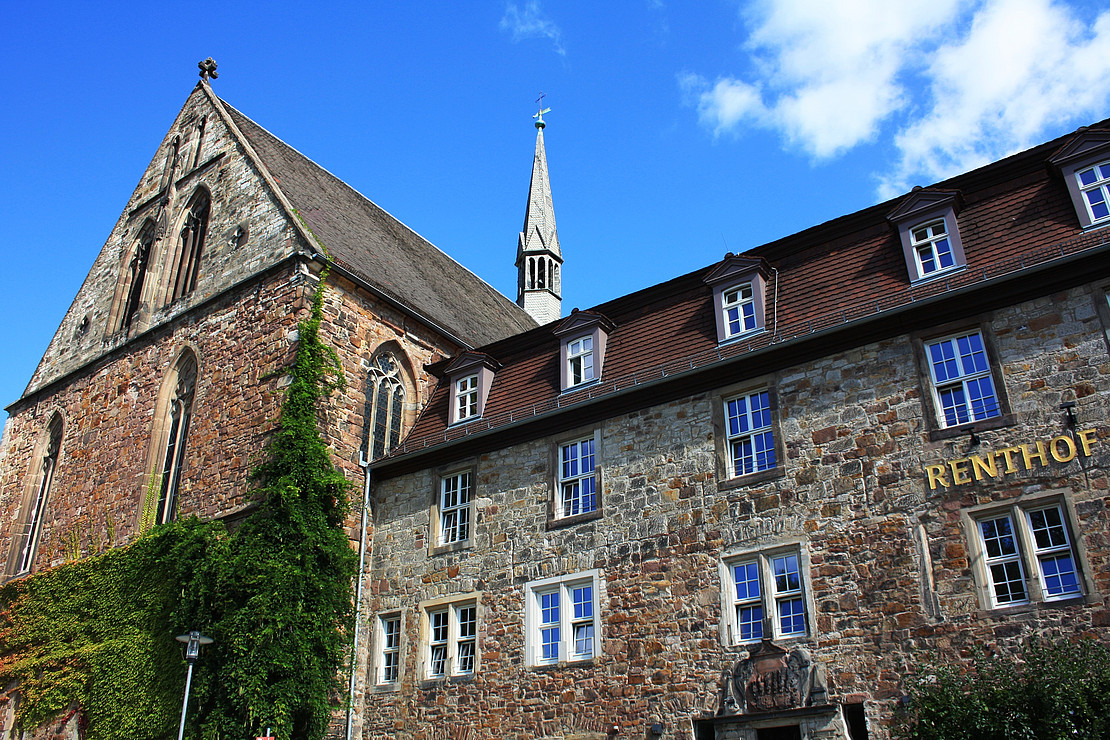This page contains automatically translated content.
When students and professors lived under one roof
 Image: Sebastian Mense
Image: Sebastian MenseIn the 17th century, Kassel was a university town, but the intergame lasted only 20 years. The reason for the foundation of the Academia Casselana were hereditary and confessional disputesbetween the Landgraves of Hesse-Kassel and Hesse-Darmstadt, as Dr. Inge Auerbach from the Marburg State Archives has explained. In 1627, Landgrave Wilhelm V of Hesse-Kassel had to give up his universitytown of Marburg to Hesse-Darmstadt, among others. A university meant great prestige for the landgraviate and so he moved the university to Kassel without further ado.
Lectures were held even before the official founding in 1629.Some of the professors from Marburg also moved to Kassel.On January 2, 1633, the Academia Casselana was solemnly opened and its statutes were enacted. It was supposed to consist of the four traditional faculties of theology, jurisprudence, medicine and philosophy. However, no suitable professor could be found for medicine.The Collegium Adelphicum, today's Renthof, housed lecture halls, seminar rooms, library and administration, as well as living and business facilities.
As in Marburg, Wilhelm V also founded a scholarship institute for the university in Kassel to train suitable but penniless candidates as pastors, teachers or for the administration of the landgraviate. Seven years were planned for the study. Those who had not graduated by then lost their right to table and bed in the Collegium.
Scholarship holders and professors lived closely together in the Collegium - a somewhat different kind of flat-sharing life.This was supposed to positively influence the students' manies. In addition, students had to be home by 9 p.m. in the summer and as early as 8 p.m. in the winter. Nighttime amusements were thus excluded. The ephorus, one of the professors, was meticulous in ensuring that the rules were observed.
Complaints about the canteen food
In the Communität, comparable to today's Mensa, there was a common meal for all. However, the menus preserved in the Marburg State Archives show great differences.Among other things, the rich students were served roast meat three times a week, plus half a pint of beer every day. The scholarship holders had to do without it altogether, and they only had meat on their plates every four weeks.Accordingly, the complaints became more frequent, especially since the university's tight finances meant that savings were also made on food.
Dean kills daughter's lover
Shortly after its founding, the young university was rocked by a scandal reported by Wolfgang Hermsdorff, local historian and former head of archives at the HNA.According to the story, Johannes Crocius, founding rector and professor of theology, was sitting in his study one evening in February 1633 and heard suspicious noises. Armed with a hammer, which he used as dean of the theological faculty to break the academic seal, hefollowed the suspected burglar. In a scuffle in the darkness, he dealt him a fatal blow with the hammer. It turned out that the young man was an ensign in the landgravial army and the secret lover of his daughter. Crocius was immediately suspended from all offices. The trial dragged on for two years and ended with an acquittal for Crocius, who got his professorship back.
Professors saw no salary
It was not only because of this scandal that the Academia Casselana could never really establish itself. The consequences of the Thirty Years' War were also felt in the Landgraviate of Hesse-Kassel and affected the university. Finances were so bad that professors were not paid for years. Vacant professorships could not be filled, and in the meantime only six professors were teaching. The number of students was also not comparable with today's university. On average, about 30 new students began their studies in Kassel each year.
The fate of Kassel's first university was ultimately decided on the battlefield. After Wilhelm's death, his widow Amalie Elisabeth and her troops succeeded in occupying Marburg in 1645. In the Peace of Westphalia in 1648, the city was restored to the Landgraviate of Hesse-Kassel. Wilhelm VI subsequently dissolved Kassel University in 1653 and elevated Marburg University to the status of a state university.
TEXT Kathrin Meckbach